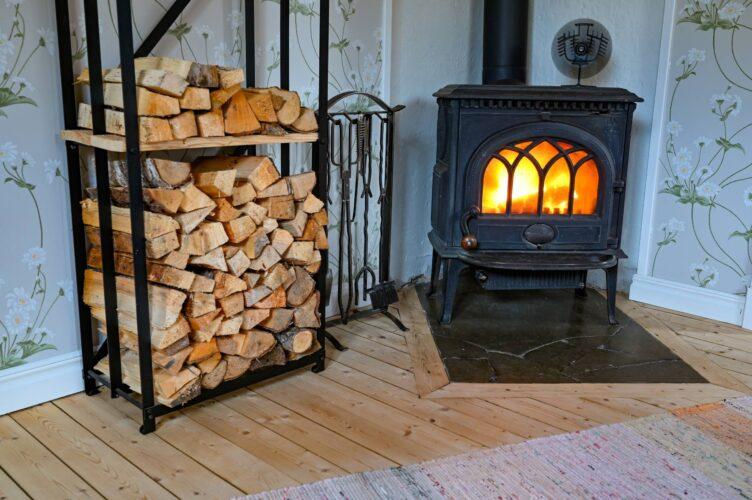
Wood heating is an environmentally friendly approach that utilises wood energy to provide heat, hot water, or steam. Proper management makes it possible to turn it into a sustainable energy source, enabling trees to grow and replace fuel. Wood heating may be carbon-neutral because carbon dioxide emitted during burning is countered by carbon absorbed during tree development. However, proper equipment and best practices are required to improve efficiency, restrict emissions, and reduce environmental concerns.
This post will discuss the environmental advantages of wood heating and how it may help you construct a greener, more comfortable house. You will understand why convection wood heaters are a guilt-free method to remain warm, regardless of whether you are considering installing them or currently have them.
What Is Wood Heating?
Wood heating produces heat in a home, commercial, or industrial setting by burning wood as a fuel source. Wood heating, a long-standing and popular option worldwide, involves burning wood in controlled environments to generate heat and hot water or steam, with its numerous advantages making it an attractive choice.
Wood is an effective heating method because it converts stored energy into heat when burnt. When collected and handled correctly, it is considered a renewable and sustainable energy source since new trees may be grown to replace those cut down.
Wood heating may be carbon-neutral because the carbon absorbed by growing trees counters the carbon dioxide emitted during burning. However, appropriate equipment and best practices must be utilised to maximise efficiency, limit emissions, and lessen the effect on air quality and the environment.
The Eco-Friendly Advantages of Wood Heating
When handled properly, wood heating, such as utilising wood stoves or fireplaces, has various eco-friendly benefits:
A Renewable Energy Source
One of wood heating’s biggest environmental advantages is using renewable energy. Wood is a greener fuel than coal and natural gas, which use limited resources and generate harmful pollutants. Trees may be replanted and cultivated expressly for heating, providing consistent and environmentally friendly fuel.
Reduced Carbon Footprint
Wood heating may have a much smaller carbon impact when effectively maintained than many alternative heating systems. While burning wood emits CO2, the carbon released is part of the natural carbon cycle. Trees absorb CO2 as they develop, and when they are burnt for heat, the CO2 emitted is absorbed by new trees. As a result of this closed carbon loop, wood heating is practically carbon neutral.
Localised Sourcing
When you use wood heating, you usually get your fuel locally. This lowers the requirement for long-distance transportation, which is typical of other fuel sources such as natural gas or oil. Local sourcing reduces fuel transportation’s environmental effect while supporting the local economy.
Efficient Use of Biomass
Wood heating efficiently utilises biomass, an important component of a sustainable energy plan. Biomass refers to organic resources such as wood that may be utilised to create heat and electricity. By using this resource for heating, you reduce waste and promote responsible resource management.
Using Convection Wood Heaters as a Greener Choice
Convection wood heaters are an environmentally responsible solution for heating areas, with various features that make them a greener option than other heating techniques. The following are the primary reasons why convection wood heaters are regarded as ecologically friendly:
Efficient Heat Distribution
Convection wood heaters are intended to disperse heat across a space evenly. They draw in chilly air, heat it, and then release it into the living room as warm air. This excellent heat distribution reduces energy loss while providing warmth to every area of the space.
Reduced Emissions
Modern convection wood heaters use sophisticated combustion technology, which results in lower emissions. They are intended to burn wood more effectively and cleanly, releasing less environmental pollutants. This is critical in reducing the environmental effect of wood heating.
Eco-Design Compliance
Many convection wood heaters are certified to satisfy eco-design requirements, guaranteeing challenges and environmental criteria are met. These qualities include minimal emissions and excellent efficiency, making them an environmentally beneficial solution for home heating.
In Summary
Wood heating is an efficient method to remain warm and cosy during the winter months and an environmentally responsible option that aligns with contemporary environmental concerns. It provides a guilt-free solution to build a pleasant and ecologically responsible home due to its renewable energy source, decreased carbon footprint, localised sourcing, and effective use of biomass.
Convection wood heaters are a fantastic alternative for individuals looking for a wood heating in Mandurah. Because of their excellent heat distribution, lower emissions, and compliance with eco-design regulations, they are a more environmentally friendly solution for keeping your house warm. You can optimise the eco-friendly advantages of wood heating while enjoying the pleasure of a warm and sustainable home by following best practices, such as utilising seasoned fuel and ensuring adequate maintenance. Stay warm while being environmentally friendly with wood heating – the ethical option for a better future.







